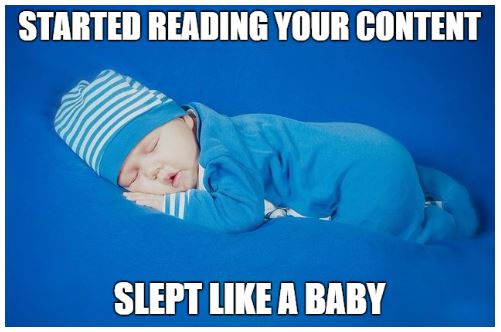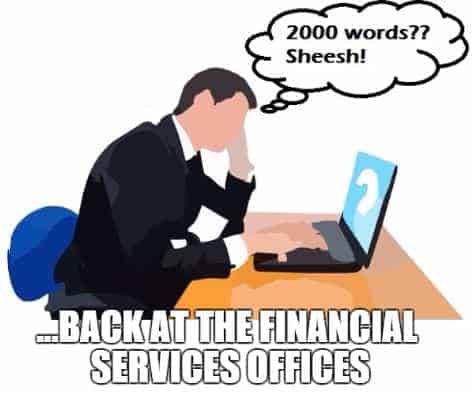Apparently Bullet Point Summary Intros are a Thing
- Today’s generations have lower attention spans.
- Long paragraphs of content are less likely to keep readers on the page.
- We need to write toward the web, and keep things snappy and easy to digest.
- I believe that wholly depends on who your target audience is.
Stay With Me
If you just read the above bullet points, and you are now reading this paragraph, I am currently at risk of losing you to the Facebook tab open to your left, or the ESPN Gamecast window open on the bottom right.
Why do I say that?
Because according to Gary Illyes, you have an 8 second attention span.
Gary’s Talk
Gary recently delivered 2 keynote speeches: one at PubCon in Vegas, and another at SMX in Jerusalem. His primary theme was that we are living in impatient times, and today’s youth are likely to leave your webpage at a moment’s notice. As a result, we need to find ways to keep them engaged.
Gary stressed the notion of ‘writing toward the web’, by delivering information to readers in a pleasant and valuable manner. This includes writing in a shorter, bite-sized prose, so that a reader will be able to easily read and digest your page’s content in a fluid manner. 
Generational Differences
Gary made it clear that he is a Millennial. Some facts about Millennials include:
- Born between 1980-2000
- Grew up with changing technology
- Always connected
- Educated
- Grew up in instability
Millennials helped usher in the age of the internet, and soon got their Generation X and Baby Boomer parents involved. But the trend toward constant connectivity continued forward with Generation Z: teenagers today are consumed with social media, short videos, messaging, and as many as 5 screens at once. Try reading an entire article with all of that competing stimulation!
Hurry
Gary’s overall advice was to cater to the user, by delivering webpages in the easiest-way-to-digest manner that one could possibly deliver. This includes writing in a bite size manner, fast loading times, callouts or bubbles to highlight extra data to a user within a paragraph, and maintaining a sense of community (with user generated comments).
Gary drove home this point by stating the following:
If your site doesn’t load in 2 seconds, you’re screwed. Gen Y & Z users will leave.
I Disagree
I wonder if an SEOer is allowed to disagree with a Googler. I’ll explain why I disagree here: Gary is pushing us to write snappier content, in an easy to digest format. And while I understand that younger generations have lower attention spans who might buckle at the thought of reading my 2000 word opus and leave my page in 4 seconds, I don’t really care. That is because it really depends on your target audience.
If I create a dense 1500 word resource page for a client in the financial services field, do I really care whether a 15 year old kid will be able to decipher any of it? And should I be concerned that this 15 year old kid will hurt my bounce rate and time on page metrics? Nope. Because he or she probably won’t even be on that page to begin with.
Certain Brands Should Care
The 15 year old kid that Gary is referring to certainly has clout, spending power, and influence. And with 80 million strong, marketing toward Generation Z is certainly something that should not be taken lightly. But in terms of writing toward the web, I believe that it completely depends on the nature of the business, and of course, website. If Nike is launching a new shoe, then by all means cater toward teens. But if you’re writing for a company whose clients are generally above the age of 40, then don’t bother.
Furthermore, I’d like to counter by saying that if the core reason behind “writing toward the web” is because of on-page metrics (15 year olds will bounce immediately), I will argue that my metrics are fine, as I am only concerned about the 54 year old financial executive who is looking for a serious financial service company. And in the financial services industry, dense is good.
In the fashion or entertainment industry, dense is probably not good, and that’s where Gary’s advice really comes in handy.
But He’s a Googler
Though I find myself at odds with a portion of Gary’s advice, I feel confident enough in my content and on-site metrics that I will not be going back and revamping large portions of content. That is, however, for clients whose websites I don’t believe a teenager or youngish person will be perusing.
And although Gary may have indicated that he thinks the entire web should head toward the bite-sized mantra, I think it really depends on the niche and industry, and in the meantime I’ll point to my on-site metrics to prove it.
